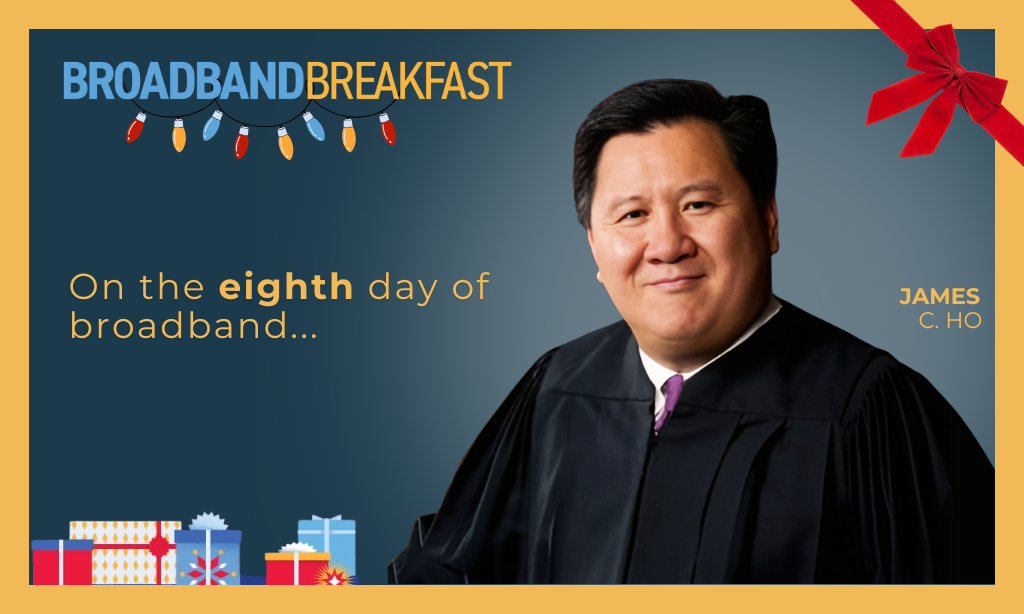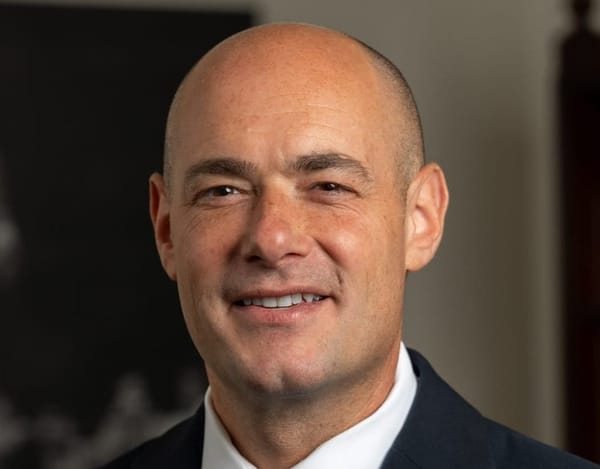A Year of Challenges for the Universal Service Fund
In 2024, USF encountered widespread calls for reforms to ensure its sustainability and effectiveness.
Jericho Casper

WASHINGTON, Dec. 27, 2024 – The $8.1 billion Universal Service Fund faced a year of challenges in 2024 triggered by a court decision that could require a new law by Congress to reverse.
Established by Congress in 1996 to support broadband access in high-cost rural areas and connect schools and libraries nationwide, the USF has been at the center of legal battles, congressional debates, and calls for significant structural reform.
The 12 Days of Broadband (click to open)
- On the First Day of Broadband, my true love sent to me:
An extra-planetary-life-promoting tech billionaire set on electing a president. - On the Second Day of Broadband, my true love sent to me: 23 million served by the Affordable Connectivity Program.
- On the Third Day of Broadband, my true love sent to me:
3rd year without the Federal Communications Commission having spectrum auction authority. - On the Fourth Day of Broadband, my true love sent to me:
$42.5 billion in Broadband Equity, Access and Deployment funds already allocated. - On the Fifth Day of Broadband, my true love sent to me:
5,500 active satellites currently in Low-Earth Orbit. - On the Sixth Day of Broadband, my true love sent to me:
More than 6 years of service at the FCC by Commissioner and Chairman-designate Brendan Carr. - On the Seventh Day of Broadband, my true love sent to me:
More than 70 billion kilowatt-hours of electricity annually consumed by data centers in the U.S. - On the Eighth Day of Broadband, my true love sent to me:
$8.1 billion dollars in annual Universal Service Funds. - On the Ninth Day of Broadband, my true love sent to me:
$90 billion in global telecom Merger & Acquisition deals value in 2024. - On the Tenth Day of Broadband, my true love sent to me:
100 broadband-related rulemakings at the FCC relying on Chevron Deference. - On the Eleventh Day of Broadband, my true love sent to me:
Nearly 11 years to complete the Rural Digital Opportunity Fund, complete with defaulted locations. - On the Twelfth Day of Broadband, my true love sent to me:
More than a dozen policy-makers and pro-tech thinkers echoing the Andreessen-Horowitz “Little Tech” agenda.
In July, the U.S. Court of Appeals for the Fifth Circuit declared, in a 9 to 7 en banc decision, that the USF’s funding mechanism unconstitutional in a potentially consequential case brought by Consumers’ Research. The ruling has thrown the future of the fund into uncertainty, with its legality now set to be reviewed by the Supreme Court in the spring of 2025.
Circuit Judge James C. Ho was in the majority. But, in a concurrence, he stressed his concern that the FCC and the Universal Service Administrative Company had been exercising taxing power vested in Congress by the Constitution: "The threats to democracy presented by the administrative state are not inadvertent, but intentional – a deliberate design to turn consent of the governed into an illusion. If you believe in democracy, then you should oppose an administrative state that shields government action from accountability to the people."
“This decision is misguided and wrong,” Federal Communications Commission Chairwoman Jessica Rosenworcel said in response to the decision. “It upends decades of bipartisan support for FCC programs that help communications reach the most rural and least-connected households in our country, as well as hospitals, schools, and libraries nationwide.”
Throughout the year, the FCC has fought to defend the fund's integrity, even as critics argued that its reliance on a surcharge from fees on voice providers was outdated and unsustainable.
As the USF approaches completion of its third decade, analysts expect reform will dominate the 2025 agendas of both the FCC and Congress. Key issues include finding a stable funding mechanism, addressing equity in distribution, and modernizing the program to reflect the changing telecommunications landscape.
A year of legal challenges
For the first half of 2024, the USF saw a momentary reprieve as the Sixth and Eleventh Circuits upheld the program as constitutional, affirming the FCC’s authority to manage and administer the fund.
However, a significant blow came in July, when with the en banc decision by the the full panel of judges on the Fifth Circuit, holding that the program violated constitutional limits by granting excessive power to the FCC and the USAC, which oversees the fund for the FCC.
Critics argued that the FCC improperly delegated legislative authority to USAC, and that the fees imposed on telecom providers resemble a tax — a power reserved for Congress.
The stakes escalated further in November, when the Supreme Court agreed to review the Fifth Circuit’s ruling. The Court has directed the parties to brief and argue whether the case is moot due to the challengers’ failure to seek preliminary relief in the Fifth Circuit, adding a procedural wrinkle to the case.
With the Supreme Court's review set for spring 2025, the fund’s fate hangs in the balance. The outcome could redefine the FCC’s authority. According to Trent McCotter, partner at Boyden Gray PLLC and counsel for Consumers' Research, the legal fight over USF could serve as a vehicle for the Supreme Court to make it harder for Congress to delegate responsibilities to federal agencies.
Division on how to fund the USF
As the legality of USF’s funding mechanism looms, debate over how to fund the USF has intensified. Ongoing discussions have included expanding USF's contribution base to include modern broadband providers, content providers like streaming services, and even edge providers.
Currently, the USF is supported by a 35.8% surcharge on telecommunications revenues from interstate and international calls, as well as from VoIP providers. — a model critics say is outdated and unfairly targets a shrinking pool of contributors. The surcharge will climb to 36.3 percent in January, the highest rate yet.
In January, FCC Chairwoman Rosenworcel wrote to Senator Ben Luján, D-N.M., who leads the Senate working group on Universal Service, noting that the current funding model “has led, and continues to lead, to a smaller and smaller contribution base,” as telephone revenues decrease.
Adding broadband providers would increase the contribution pool to $250 billion from $33 billion and decrease telecom’s contribution factor – from about 34 percent to about 3 percent, Rosenworcel said in her Jan. 12 letter to Luján.
Yet, in April, the Federal Communications Commission exempted broadband internet access service providers from contributing to the USF. This decision was part of a broader net neutrality order and was made to address concerns about rising consumer costs.
At the time of the decision, the FCC estimated that applying the contribution factor to broadband bills in addition to phone bills, would increase internet bills by about $5 to $17. It is possible companies would not pass the added cost onto consumers, but not likely: 82 percent of current USF contributors choose to do so.
“We currently lack sufficient information to determine how significant the effect would be on overall consumer bills,” Rosenworcel wrote to Luján.
Advocacy groups, including the Affordable Broadband Campaign and WTA ‒ Advocates for Rural Broadband, pushed back, arguing that by “forbearing” from applying USF obligations on broadband companies was closing the door on the best opportunity to subsidize broadband connections for low-income Americans.
“There is strong evidence presented in the record that demonstrates the need for the FCC to begin the process of considering whether and how [broadband ISP] revenues could help,” argued an advocacy spokesperson.
An economic analysis by the Brattle Group projects that, without reform, voice provider’s contribution to the USF will rise to 44 percent in 2025 and almost 50 percent in 2027.
Incoming FCC Chairman Brendan Carr, has proposed expanding the contribution base to include Big Tech companies like Alphabet, Meta, Apple, Amazon, Microsoft, and Netflix, which depend on robust internet infrastructure funded by others.
"Big Tech has been enjoying a free ride on our Internet infrastructure while skipping out on the billions of dollars in costs needed to maintain and build that network,” Carr has said.
A report by Strand Consult, estimated these internet companies derived an estimated $58 billion to $115 billion in revenue in 2023 from users connecting to the internet through the USF and the now-ended Affordable Connectivity Program.
AT&T and other industry stakeholders have echoed these calls, arguing that as dominant users of broadband networks, these companies should contribute to USF.
Meanwhile, former FCC Chair Ajit Pai and Senator Ted Cruz, R-Texas, have advocated for a more radical shift: funding the USF through direct congressional appropriations. “I do think that the time has come for Congress to shift this to a general appropriation,” Pai suggested in November.
Senate Majority Leader John Thune, R-S.D., has floated the idea of tying USF funding to spectrum revenues but remains cautious about annual appropriations.
Some have suggested even more creative approaches to generate funds for the USF without directly impacting consumer broadband prices. In October, Benton senior fellow John Horrigan and Brookings non-resident senior fellow Blair Levin suggested funding the USF by increasing taxes on online gambling revenues.
Modernizing and reforming USF, post-BEAD
With the $42.5 billion Broadband Equity, Access, and Deployment program significantly enhancing rural broadband infrastructure, analysts have called for a reassessment of the USF’s priorities.
With BEAD addressing many connectivity gaps, some have questioned whether programs within USF, like E-Rate, which connects schools and libraries, should be restructured or downsized.
“We have an opportunity, with a new Congress to come up with a solution for Universal Service that will deal, I hope, not only with the contribution side, but also with the distribution side,” said Gigi Sohn, who was previously nominated to serve as a commissioner of the FCC, but now heads the American Association for Public Broadband and represents the Affordable Broadband Campaign.
“One of the things that, unfortunately, this FCC failed to do, even though Congress told it to do, was to look at how the BEAD program and the ACP would impact the whole Universal Service Fund,” Sohn said, speaking at a Broadband Breakfast public policy event on the communications agenda of the incoming Trump administration in December.
“It's time to look at those things again. I think we need to look at every single one of the programs and [ask], in the wake of $42.5 billion investment, and in the wake of changes in technology and changes in adoption of technology, what is the right balance?”
In 2023, the Universal Service Fund allocated $4.3 billion to subsidize broadband in high-cost rural areas, $2.4 billion to connect schools and libraries, and $869.8 million to assist 7.3 million low-income participants through the Lifeline broadband program, according to USAC’s annual report. USAC has yet to release its 2024 annual report.








Member discussion